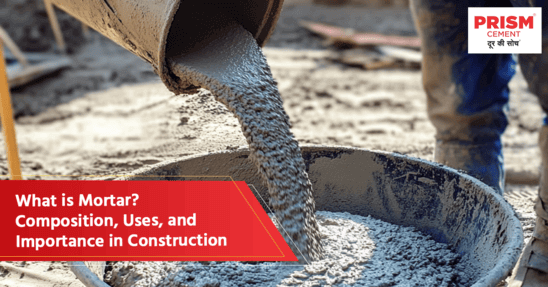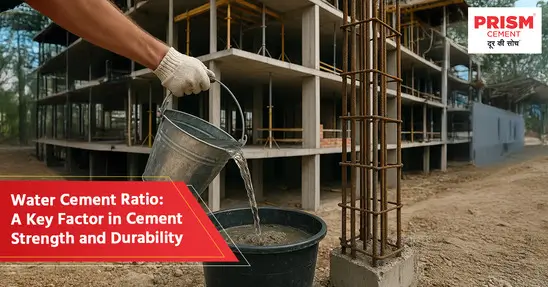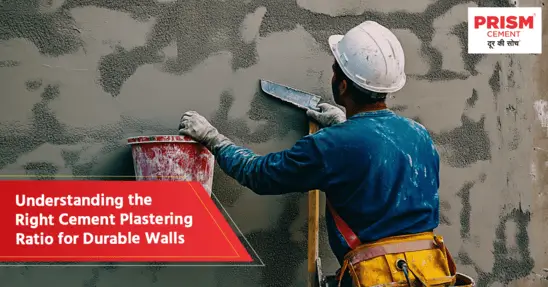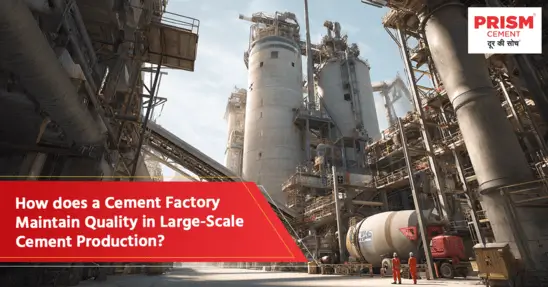Walk past any construction site and you’ll see mortar at work—literally holding things together. Whether it's used for bricklaying, plastering or repairing walls, cement mortar is one of the most essential materials in construction.
But what exactly is mortar? How is it different from ready mix concrete? And what makes the perfect mortar mix ratio? If you’re planning a construction project, understanding what is mortar and how to use it effectively can make all the difference.
At Prism Cement, we believe in using high-quality materials to ensure strong and long-lasting structures. Let’s break it down.
What is Mortar?
Mortar is a paste-like substance made by mixing cement, sand and water. It’s primarily used to bind bricks, stones and concrete blocks together. Unlike ready mix concrete, which is used for solid structures like foundations and slabs, mortar is used to provide adhesion and flexibility.
There are different types of mortar, each suited for specific tasks. Whether you're building walls, plastering or repairing cracks, choosing the right mortar composition is crucial.
Composition of Mortar
The strength and durability of mortar depend on its ingredients and mortar mix ratio. Here’s what goes into making the perfect cement mortar:
- Cement – The binding agent that holds everything together
- Sand – Prevents cracking
- Water – Activates the cement and allows the mortar mix to harden
- Lime (Optional) – Improves workability and flexibility, making smoother and more durable the mortar for plastering
- Additives – Chemicals can be added to enhance strength, water resistance or setting time
Getting the right mortar mix ratio is essential for a strong, durable bond.
Types of Mortar and Their Uses
Different types of mortar are used for different purposes in construction. Here are the most common ones:
1. Cement Mortar
The ratio of blending cement, water and sand (fine aggregate) depends on purpose and durability. This is the most widely used mortar for masonry, plastering and general construction.
2. Lime Mortar
Made with lime, sand and water, this type of mortar is flexible, perfect for historic buildings and traditional construction.
3. Gypsum Mortar
Ideal for interior walls, gypsum mortar is smooth and quick setting.
4. Ready Mix Mortar
Pre-mixed in factories, ready-mix mortar ensures consistency and saves time on-site.
Choosing the right mortar composition is key to ensuring a strong and durable structure.
Importance of Mortar in Construction
Why is mortar so important?
- Holds Structures Together – Acts as the glue between bricks and stones
- Prevents Water Seepage – Proper mortar for plastering protects walls from moisture damage.
- Improves Structural Stability – A well-mixed mortar composition ensures strong and durable construction.
- Aesthetic Appeal- Mortar can be used to create smooth and aesthetically pleasing finishes on masonry surfaces. It can also be colored and textured to match or complement the building’s design, enhancing its visual appeal.
How to Mix Mortar?
Mixing mortar in the right way is crucial. Follow these steps for the perfect mortar mix ratio:
- Measure Ingredients – Typically, the ratio is 1 part cement to 2-6 parts sand, depending on the application.
- Dry Mix – Blend the cement and sand before adding water
- Gradually Add Water – Mix until you achieve a thick, paste-like consistency
- Use Immediately – Mortar starts setting quickly, so use it within 30-60 minutes.
A good mortar mix ratio ensures better adhesion and durability.
Common Mistakes to Avoid When Using Mortar
- Adding Too Much Water – Weakens the mortar and causes cracks
- Incorrect Mix Ratio – Using too much or too little cement affects strength
- Not Using Fresh Mortar – Old mortar loses its adhesive properties.
- Skipping Curing – Proper curing helps prevent cracks and improves durability.
By avoiding these mistakes, you can ensure that your mortar for plastering or bricklaying lasts for years.
Conclusion
Mortar is one of the most essential materials in construction, ensuring that bricks, stones and blocks stay firmly in place. Whether you’re working on plastering, masonry or repairs, understanding the right mortar mix ratio and using high-quality cement mortar makes all the difference.
At Prism Cement, we provide the best cement solutions for all construction needs. Looking for expert advice? Contact Prism Cement today!
Frequently Asked Questions (FAQ)
Q1. What is mortar, and how is it made?
Answer: Mortar is a mix of cement, sand and water, used for bonding bricks and plastering walls.
Q2. What are the different types of mortar used in construction?
Answer: Common types of mortar include cement mortar, lime mortar, gypsum mortar and ready-mix mortar.
Q3. Why is mortar important for masonry work?
Answer: Mortar holds bricks and stones together, prevents water damage and ensures long-lasting construction.
Q4. How does the choice of mortar affect the strength of a structure?
Answer: The right mortar mix ratio improves adhesion, prevents cracks and enhances durability.
Q5. What additives can be used to improve mortar quality?
Answer: Lime, plasticizers and waterproofing agents can be added to enhance mortar composition.




